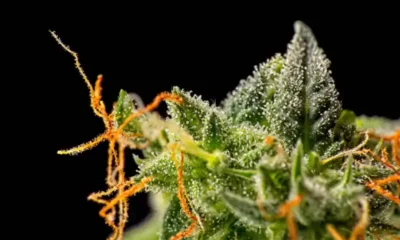Connect with us
Published
6 months agoon

In the midst of ever-growing cannabis reform across the U.S., workplaces specifically in states that have ushered in adult-use cannabis programs have gradually shifted the way they treat cannabis in regard to drug testing. While legal states have taken a variety of approaches to drug testing for cannabis, the resounding sentiment is beginning to shift, reflecting that off-the-clock, legal cannabis use is on par with using other legal drugs like alcohol on one’s own time.
Though, some workers across the country must still avoid cannabis as their workplaces abide by federal law, which still classifies cannabis as a Schedule I controlled substance. Among those entities is the U.S. Department of Agriculture (USDA), which recently issued a notice to employees “regarding the use of illegal drugs,” specifically turning attention toward cannabis, THC and even CBD, which on its own does not appear on drug tests.
The notice reminds USDA employees that they are “required to follow all Federal laws regarding the use of illegal drugs, including cannabis, also commonly known as marijuana.” The notice recognizes the “significant changes” to societal perspectives around “certain drugs,” naming cannabis and cannabis products explicitly.
“Many states have legalized cannabis use for medicinal purposes. Some states allow cannabis use recreationally, much like tobacco or alcohol products,” it reads. “There is also confusion around state-by-state legalization changes and the rapidly expanding availability of cannabis products.”
The notice also names CBD, a non-psychotropic cannabinoid which was federally legalized by the 2018 Farm Bill and has its own emerging market in states with and without legal cannabis laws. It states that CBD products “are not generally regulated by the Food and Drug Administration (FDA) or other regulatory agencies to ensure the labels are truthful and accurate.”
Specifically, the notice says that CBD products may contain THC, even if the label says it doesn’t.
“In fact, there has been a noticeable uptick in cases of Federal employees failing drug tests throughout the United States. In some situations, these failed drug tests resulted in corrective actions, including suspensions or loss of employment for federal employees,” the notice states.
While third-party test results typically verify the specific contents of hemp-derived cannabinoid products, the 2018 Farm Bill does allow for hemp-derived products to contain up to 0.3% THC, which does carry the potential for a positive THC drug test. Still, this sentiment applies explicitly to full-spectrum CBD products, which are advertised as containing up to 0.3% THC, whereas broad-spectrum and isolate products do not contain THC.
The notice also indicates that changes in “societal perspectives and state laws” could mean that Food Safety and Inspection Service (FSIS) employees may be inadvertently exposed to cannabis products “in social situations” like “celebrations” where cannabis products are present. The notice adds that, “It is important to know that cannabis use can negatively impact federal employment.”
The USDA is the most recent of a number of long-established entities addressing the changing cannabis landscape.
Earlier this year, the Department of Transportation shifted its policy to allow for oral fluid testing, as opposed to urine testing, to improve accuracy of testing since THC metabolites can be found in urine weeks or even months after cannabis use. The United States Secret Service also adjusted its policy earlier this year, allowing candidates of any age to be eligible for employment one year after they last consumed cannabis.
Even the U.S. Military has adjusted its rules recently, with the Air Force allowing more leniency for applicants who tested positive for THC. Inspired by the Army and Navy, the Air Force and Space Force now allow some applicants who test positive for THC to retest again and potentially enlist. The Air Force ultimately granted more than triple the projected amount of waivers during the program’s first year. Additionally, some politicians have argued that cannabis testing for military members should cease entirely.
It’s also possible that this entire conversation may soon see a shift, as cannabis is in the midst of a potential rescheduling from Schedule I to Schedule III under the Controlled Substances Act.


Despite City Efforts, Hemp Shops Posing as Dispensaries Prevail in Las Vegas


Cannabis Community, Investors React to DEA Decision To Reschedule


Georgia Governor Signs Bill Establishing Licensing Requirements To Grow Hemp


Study: Psilocybin Enhances Meditation


Ohio GOP Lawmakers Debate Adult-Use MJ Priorities, Eye June for Regulation Approval


Taylor Swift Puts Narcotics Into All of Her Songs on ‘The Tortured Poets Department’
